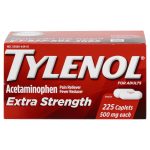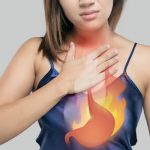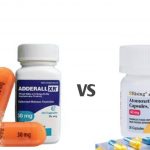How Long Does Adderall Take To Kick In On An Empty Stomach?

When our body begins to metabolize a medication, different organs process the ingredients before they are finally released into the bloodstream. While the process may sound straightforward, different drugs dissolve at different rates, different formulas, and dosages break down differently – and, everybody’s body metabolizes medication uniquely. These are just a few of the many complexities behind the nature of drug absorption and metabolism.
The vast majority of drugs are taken orally and are broken down within the gastrointestinal tract. Once the medication arrives, it is broken down by stomach acids before it passes through the liver and then enters the bloodstream. Certain medications may start working immediately others may stay in the bloodstream longer – it all depends on the dosage and drug family consumed.
What is Adderall?
Adderall is a combination of Dextroamphetamine and amphetamine used as part of a treatment program to control symptoms of attention deficit hyperactivity disorder (ADHD; more difficulty focusing, controlling actions, and remaining still or quiet than other people who are the same age).
Adderall is used to treat ADHD in adults and children 3 years of age and older. Adderall XR is used to treat ADHD in adults and children 6 years of age and older. Mydayis is used to treat ADHD in adults and children 13 years of age and older. Adderall is also used to treat narcolepsy (a sleep disorder that causes excessive daytime sleepiness and sudden attacks of sleep) in adults and children 12 years of age and older.
How Adderall works
Adderall is in a class of medications called central nervous system stimulants. It works by changing the amounts of certain natural substances in the brain.
How should I take Adderall?
Take Adderall exactly as prescribed by your doctor.
ADHD: In children from 3 to 5 years of age, start with 2.5 mg daily; daily dosage may be raised in increments of 2.5 mg at weekly intervals until optimal response is obtained. In children 6 years of age and older, start with 5 mg once or twice daily; daily dosage may be raised in increments of 5 mg at weekly intervals until optimal response is obtained. Only in rare cases will it be necessary to exceed a total of 40 mg per day. Give first dose on awakening; additional doses (1 or 2) at intervals of 4 to 6 hours.
Narcolepsy: The usual dose is 5 mg to 60 mg per day in divided doses, depending on the individual patient’s response.
Follow all directions on your prescription label. Your doctor may occasionally change your dose. Do not take this medicine in larger or smaller amounts or for longer than recommended.
Adderall may be habit-forming. Never share this medicine with another person, especially someone with a history of drug abuse or addiction. Keep the medication in a place where others cannot get to it. Selling or giving away this medicine is against the law.
Read all patient information, medication guides, and instruction sheets provided to you. Ask your doctor or pharmacist if you have any questions.
While using this medicine, your doctor will need to check your progress at regular visits. Tell any doctor who treats you that you are using this medicine.
Adderall can cause unusual results with certain medical tests. Tell any doctor who treats you that you are using this medicine. Do not take Adderall if it is expired or appears to have been tampered with.
Does food affect the absorption of Adderall?
No, food does not significantly interact with Adderall as a result a dose may be taken with or without food, first thing in the morning. However, a new study has demonstrated that food has an effect on the concentration of Adderall XR in the body implying that taking the medication on an empty stomach might increase early drug exposure which is very vital for attention-deficit hyperactivity disorder (ADHD) symptom control during school or work hours.
How long does Adderall take to kick in on an empty stomach?
There are several factors at play when determining the overall time Adderall takes to kick when taken on an empty stomach. The following factors all impact an individual’s sensitivity to and absorption of medication:
• Age
• Weight
• Gender
• Time of day taken
• Level of physical activity
• Level of stress
• Content of stomach and PH level
• Presence of other medications.
Gastric acids may also affect the breakdown of certain Adderall metabolites.
In general, it takes about 30-45 minutes for the effects of Adderall to kick in when taken on an empty stomach. These effects last for around four hours and up to 12 hours for Adderall XR. The medication is effective immediately after it crosses the blood-brain barrier.
However, it can take several weeks to get the full effect of the medication. Your health care provider may also need to gradually adjust the dose to find the dose that works best for you.
What are the likely side effects of Adderall?
Adderall may cause side effects. Tell your doctor if any of these symptoms are severe or do not go away:
• changes in sex drive or ability
• constipation
• diarrhea
• dry mouth
• headache
• nausea
• nervousness
• painful menstrual cramps
• weight loss
Some side effects can be serious. If you experience any of the following symptoms, call your doctor immediately or get emergency medical treatment:
• agitation, hallucinations (seeing things or hearing voices that do not exist), fever, sweating, confusion, fast heartbeat, shivering, severe muscle stiffness or twitching, loss of coordination, nausea, vomiting, or diarrhea
• believing things that are not true
• blistering or peeling skin
• changes in vision or blurred vision
• depression
• difficulty breathing or swallowing
• dizziness
• feeling unusually suspicious of others
• hallucinating (seeing things or hearing voices that do not exist)
• hives
• hoarseness
• itching
• mania (frenzied or abnormally excited mood)
• motor or verbal tics
• pain, numbness, burning, or tingling in the hands or feet
• paleness or blue color of fingers or toes
• rash
• seizures
• slow or difficult speech
• swelling of the eyes, face, tongue, or throat
• teeth grinding
• unexplained wounds appearing on fingers or toes
• weakness or numbness of an arm or leg
Adderall may cause sudden death in children and teenagers, especially children or teenagers with heart defects or serious heart problems. This medication also may cause sudden death, heart attack, or stroke in adults, especially adults with heart defects or serious heart problems. Call your doctor right away if you or your child has any signs of heart problems while taking this medication including chest pain, shortness of breath, or fainting. Talk to your doctor about the risks of taking this medication.
Adderall may slow children’s growth or weight gain. Your child’s doctor will watch his or her growth carefully. Talk to your child’s doctor if you have concerns about your child’s growth or weight gain while he or she is taking this medication. Talk to your child’s doctor about the risks of giving Adderall to your child.





